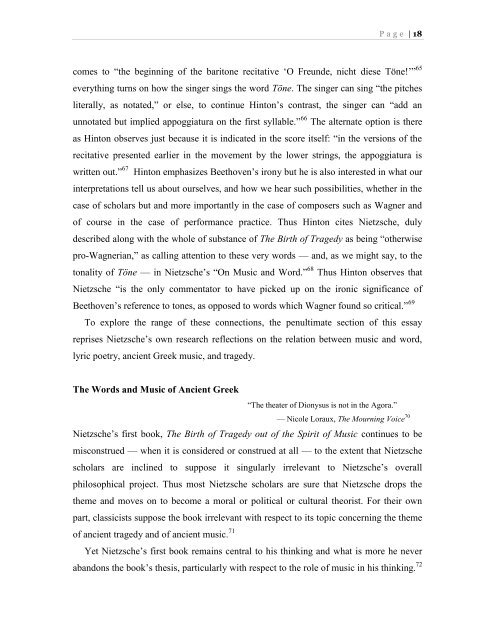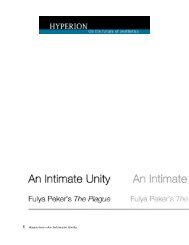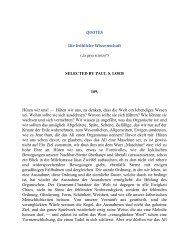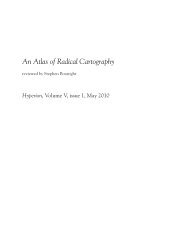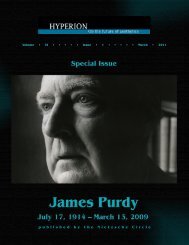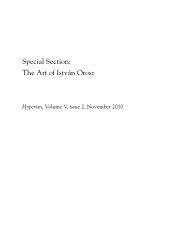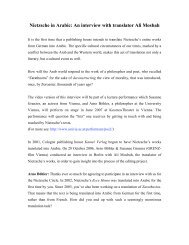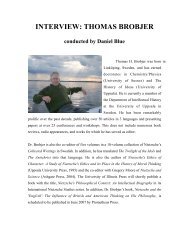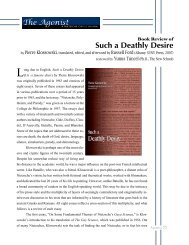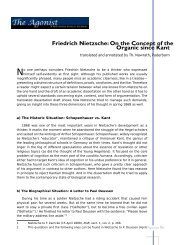Music, The Birth of Tragedy, and Nietzche's ... - Nietzsche Circle
Music, The Birth of Tragedy, and Nietzche's ... - Nietzsche Circle
Music, The Birth of Tragedy, and Nietzche's ... - Nietzsche Circle
You also want an ePaper? Increase the reach of your titles
YUMPU automatically turns print PDFs into web optimized ePapers that Google loves.
P a g e | 18<br />
comes to “the beginning <strong>of</strong> the baritone recitative ‘O Freunde, nicht diese Töne!’” 65<br />
everything turns on how the singer sings the word Töne. <strong>The</strong> singer can sing “the pitches<br />
literally, as notated,” or else, to continue Hinton’s contrast, the singer can “add an<br />
unnotated but implied appoggiatura on the first syllable.” 66 <strong>The</strong> alternate option is there<br />
as Hinton observes just because it is indicated in the score itself: “in the versions <strong>of</strong> the<br />
recitative presented earlier in the movement by the lower strings, the appoggiatura is<br />
written out.” 67 Hinton emphasizes Beethoven’s irony but he is also interested in what our<br />
interpretations tell us about ourselves, <strong>and</strong> how we hear such possibilities, whether in the<br />
case <strong>of</strong> scholars but <strong>and</strong> more importantly in the case <strong>of</strong> composers such as Wagner <strong>and</strong><br />
<strong>of</strong> course in the case <strong>of</strong> performance practice. Thus Hinton cites <strong>Nietzsche</strong>, duly<br />
described along with the whole <strong>of</strong> substance <strong>of</strong> <strong>The</strong> <strong>Birth</strong> <strong>of</strong> <strong>Tragedy</strong> as being “otherwise<br />
pro-Wagnerian,” as calling attention to these very words — <strong>and</strong>, as we might say, to the<br />
tonality <strong>of</strong> Töne — in <strong>Nietzsche</strong>’s “On <strong>Music</strong> <strong>and</strong> Word.” 68 Thus Hinton observes that<br />
<strong>Nietzsche</strong> “is the only commentator to have picked up on the ironic significance <strong>of</strong><br />
Beethoven’s reference to tones, as opposed to words which Wagner found so critical.” 69<br />
To explore the range <strong>of</strong> these connections, the penultimate section <strong>of</strong> this essay<br />
reprises <strong>Nietzsche</strong>’s own research reflections on the relation between music <strong>and</strong> word,<br />
lyric poetry, ancient Greek music, <strong>and</strong> tragedy.<br />
<strong>The</strong> Words <strong>and</strong> <strong>Music</strong> <strong>of</strong> Ancient Greek<br />
“<strong>The</strong> theater <strong>of</strong> Dionysus is not in the Agora.”<br />
— Nicole Loraux, <strong>The</strong> Mourning Voice 70<br />
<strong>Nietzsche</strong>’s first book, <strong>The</strong> <strong>Birth</strong> <strong>of</strong> <strong>Tragedy</strong> out <strong>of</strong> the Spirit <strong>of</strong> <strong>Music</strong> continues to be<br />
misconstrued — when it is considered or construed at all — to the extent that <strong>Nietzsche</strong><br />
scholars are inclined to suppose it singularly irrelevant to <strong>Nietzsche</strong>’s overall<br />
philosophical project. Thus most <strong>Nietzsche</strong> scholars are sure that <strong>Nietzsche</strong> drops the<br />
theme <strong>and</strong> moves on to become a moral or political or cultural theorist. For their own<br />
part, classicists suppose the book irrelevant with respect to its topic concerning the theme<br />
<strong>of</strong> ancient tragedy <strong>and</strong> <strong>of</strong> ancient music. 71<br />
Yet <strong>Nietzsche</strong>’s first book remains central to his thinking <strong>and</strong> what is more he never<br />
ab<strong>and</strong>ons the book’s thesis, particularly with respect to the role <strong>of</strong> music in his thinking. 72


